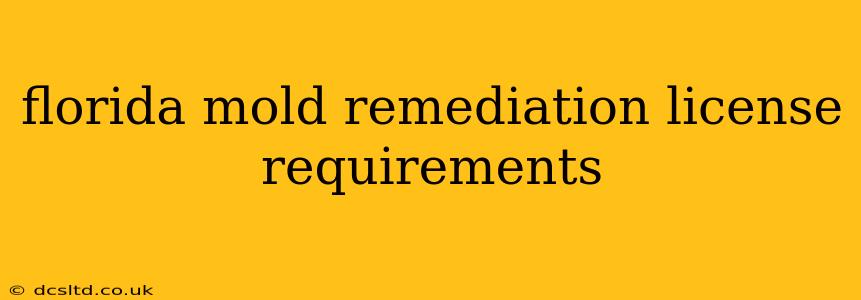Mold remediation in Florida is a serious business, impacting public health and safety. Therefore, the state has implemented stringent licensing requirements to ensure qualified professionals handle mold removal and mitigation. This comprehensive guide details the necessary steps to obtain a Florida mold remediation license, clarifying the process and addressing frequently asked questions.
What are the basic requirements for a Florida mold remediation license?
To obtain a Florida mold remediation contractor's license, applicants must meet several criteria. These include:
- Age: Be at least 18 years old.
- Education: Possess a high school diploma or equivalent (GED). While not explicitly required for the license itself, a strong background in construction, environmental science, or a related field is highly advantageous.
- Experience: Demonstrate sufficient experience in mold remediation. The specific requirements concerning experience vary, so consulting the Florida Department of Business and Professional Regulation (DBPR) website for the most up-to-date information is crucial. This often involves submitting proof of prior work experience, such as contracts, job descriptions, or letters of recommendation.
- Financial Responsibility: Meet financial responsibility requirements set by the DBPR, which may include surety bonds or other financial assurances. These requirements help protect consumers in case of contractor negligence or failure.
- Background Check: Pass a background check conducted by the DBPR, indicating a clean criminal record. A criminal history may disqualify an applicant.
- Exam: Successfully pass the state's required contractor examination for mold remediation. This exam tests knowledge of mold identification, remediation techniques, safety protocols, and relevant regulations.
How do I apply for a Florida mold remediation license?
The application process involves several steps:
- Gather necessary documentation: Compile all required documents, including proof of education, experience, financial responsibility, and a completed application form.
- Complete the application: Fill out the application form accurately and completely. Any inaccuracies or omissions can delay the process.
- Submit the application and supporting documents: Submit your application and supporting documents to the DBPR. The DBPR website provides specific instructions on how and where to submit the application.
- Pay the application fee: Pay the required application fees, which are subject to change. Always confirm the current fee amount on the DBPR website.
- Pass the examination: Schedule and pass the state's licensing examination. Preparation resources are often available through various training programs and study materials.
- Receive your license: Upon successfully completing all requirements, the DBPR will issue your mold remediation contractor's license.
What is the cost of obtaining a Florida mold remediation license?
The cost of obtaining a Florida mold remediation license involves several fees, including the application fee, examination fee, and possibly other associated costs. These fees are subject to change, so checking the DBPR website for the most current information is vital.
How long does it take to get a Florida mold remediation license?
The processing time for a Florida mold remediation license varies, depending on the completeness of the application and the workload of the DBPR. Allow ample time for the entire process to be completed. Contacting the DBPR directly for an estimated timeframe is advisable.
What continuing education requirements are there for Florida mold remediation licenses?
Maintaining a Florida mold remediation license requires adhering to continuing education (CE) requirements. The specific number of CE hours required annually varies, so consult the DBPR for current regulations. These CE courses often cover updates in mold remediation techniques, safety protocols, and relevant legislation. Failure to fulfill these requirements can lead to license suspension or revocation.
Are there different types of mold remediation licenses in Florida?
Florida's licensing system generally focuses on a single contractor's license for mold remediation. However, the scope of work permitted under the license may be subject to specific limitations or requirements depending on the complexity of the mold problem. Always adhere to all applicable regulations and restrictions when undertaking any mold remediation project.
This information is for guidance only and should not be considered legal advice. Always consult the official Florida Department of Business and Professional Regulation (DBPR) website for the most current and accurate information on Florida mold remediation license requirements.
